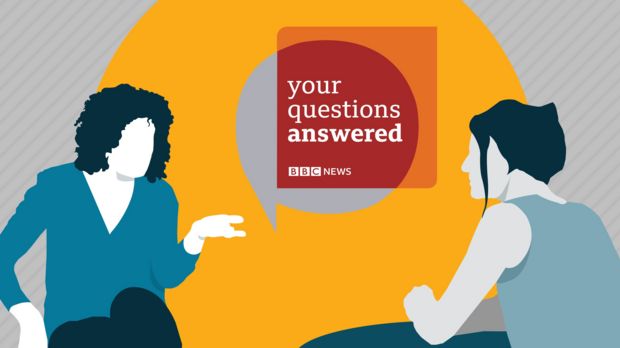
Will I still get paid if I have to self-isolate? And other questions
People who've been in close contact with someone found to have Covid-19 in England and Scotland are now being traced by thousands of health workers.
BBC News answers some of your questions on how the schemes will work.
Questions and answers
Latest questions
Your questions
If you have to self-isolate will you only get statutory sick pay, or will your employer pay your salary? from Laura White in Herefordshire

BBC News Reality Check
The government advises that people who are self-isolating should work from home wherever possible and be paid as normal.
If they can’t work from home, employers must ensure any self-isolating employee gets sick pay or is allowed to use paid leave days if they prefer.
Employees in self-isolation are entitled to Statutory Sick Pay for every day they are in isolation, worth £95.85 per week, as long as they qualify.
However, employers can choose to pay staff their full wages during this period if they wish.
How will we know the difference between a genuine contact tracer and a potential scammer? from James Wilson in Nuneaton

BBC News Reality Check
If you are concerned about whether a call, text or email is genuine, you can check the NHS England Test and Trace service website or the Scottish Government Test and Protect website or the Public Health Agency website in Northern Ireland.
Genuine contract tracers will never ask you for any financial information such as credit card or bank details.
They will also not ask you to set up a password or Pin over the phone, or to call a premium rate number, such as those starting 09 or 087.
If you don’t want to talk over the phone in England, you can ask for an email or text inviting you to log into the web-based service instead.
How will people who don't have a mobile phone be able to submit that they have symptoms? From Lorna Miller in Liverpool

BBC News Reality Check
People experiencing symptoms will be asked to report this as soon as possible and order a test.
You can either do this via the NHS website or if you do not have access to the internet you can dial 119 in England, Wales and Northern Ireland or 0800 028 2816 in Scotland.
If you have been exposed to someone who has tested positive you may be contacted by text message, email or phone.
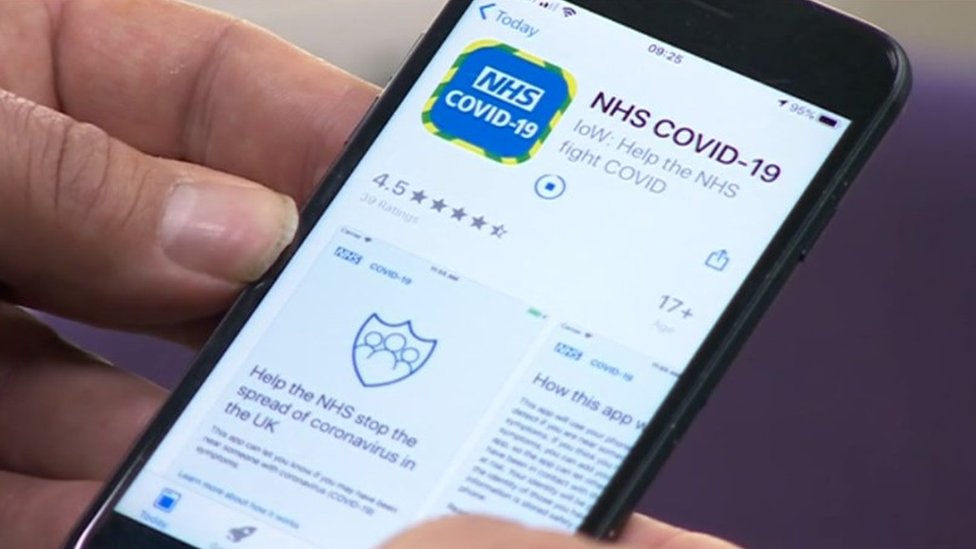
The only part of the process which will need a smartphone is the contact tracing app. That has not yet been launched in England outside the Isle of Wight.
When it is, it will provide extra information for contact tracers, but they will still be able to do everything else via a landline or online.
Are tracers going to track those people who tested positive before Wednesday? from Elaine Piper in Doncaster

BBC News Reality Check
No.The Department of Health says the service will begin tracking those who tested positive in England on Wednesday and going forward.
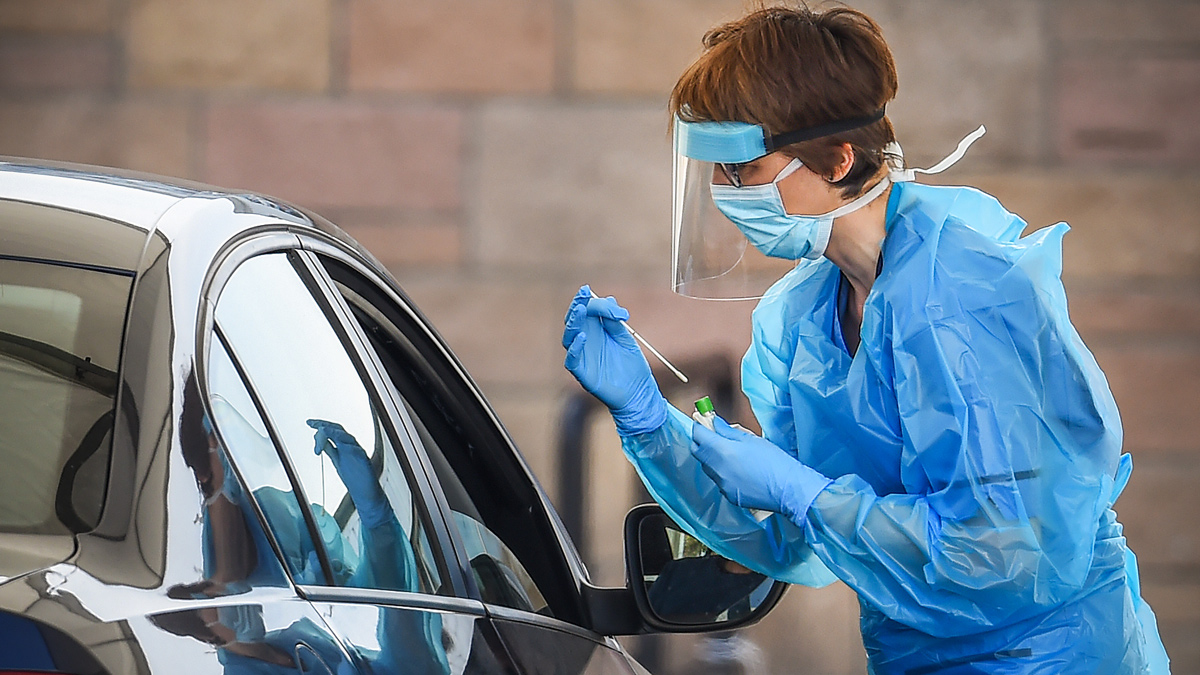
Anyone who tested positive before that should already be self-isolating for at least seven days, with other members of their household self-isolating for 14 days
I work in a care home so if I test positive, does that mean the whole staff team needs to self-isolate? from Iva
While most NHS contact tracers won’t be trained health professionals, there is also a clinical team of local public health experts which will deal with more complex cases.
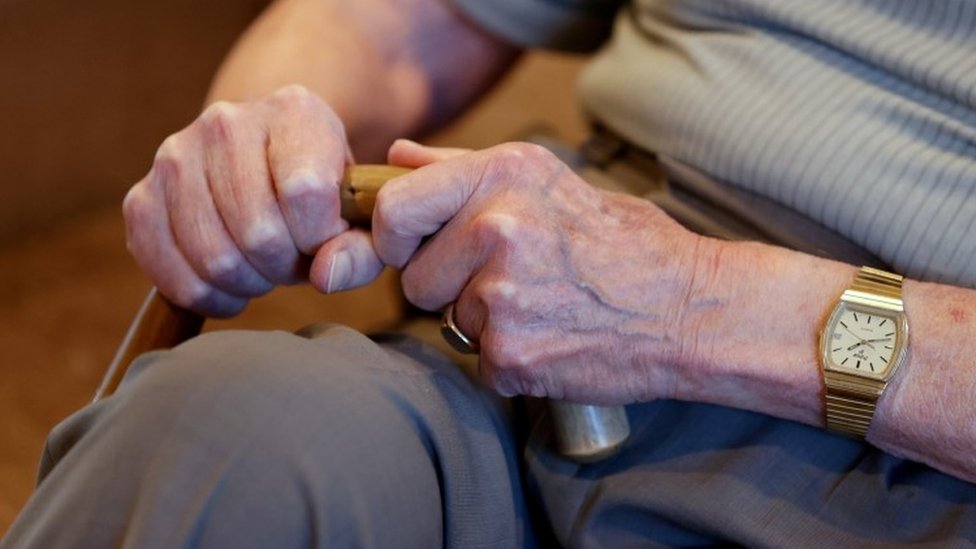
The Department of Health says if someone who works in a care home tests positive, it will be escalated to this team and it will work with the care home to agree the best course of action.
It will consider things like whether personal protective equipment was worn and whether staff had been able to remain at a distance from each other.
What if a person who tested positive has travelled by train? How are you supposed to know the names and contact details of fellow passengers who are strangers? from Roger Langford in Chapel en le Frith

BBC News Reality Check
You will only be asked to report contacts known to you, especially anyone in your household, people with whom you’ve been in close physical contact (less than 1m (3ft)), or have been within 2m (6ft) of for more than 15 minutes.
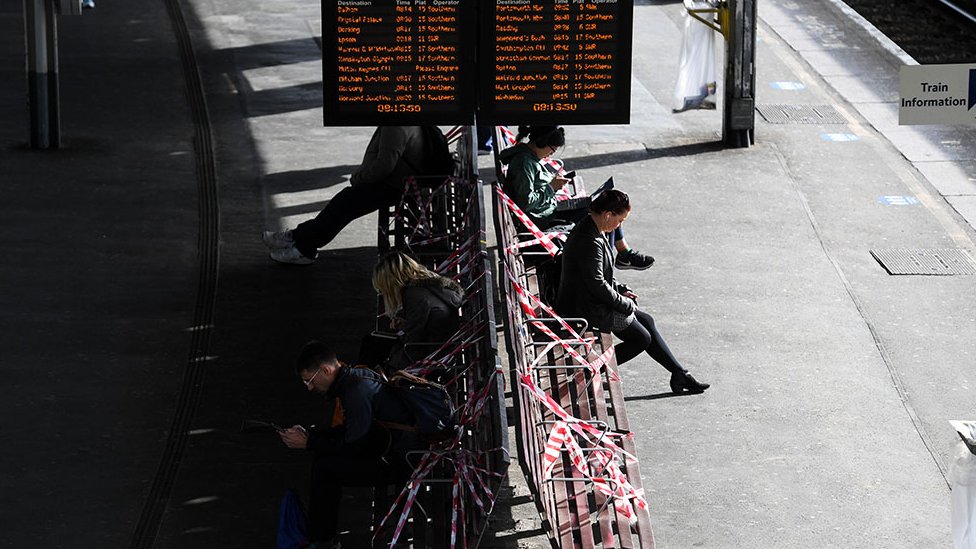
The government's contact tracing app is not yet up and running. When it becomes widely available, it will be used to track down contacts like strangers with whom you’ve shared a bus or train carriage.
Will people who have previously tested positive for Covid-19 and have already self-isolated have to self-isolate again?

BBC News Reality Check
Yes, people who have previously tested positive will be asked to self-isolate again.
That's because there are still a number of uncertainties about whether having coronavirus gives you immunity, or whether people with immunity can transmit the illness to others.
Health Secretary Matt Hancock, who tested positive for the virus in March, told LBC Radio that he would have to isolate if he was approached by a contact tracer.
If an online grocery delivery driver tests positive for Covid-19, would they need to let the Test and Trace service know every customer they’ve delivered to because they will have handled the food or bags? From Jan in Wiltshire

BBC News Reality Check
No. The tracers will be interested in anybody who has had close contact with a person who has tested positive.
Close contact means being less than 1m (3ft) from somebody at any point, or between 1m and 2m away for more than 15 minutes.
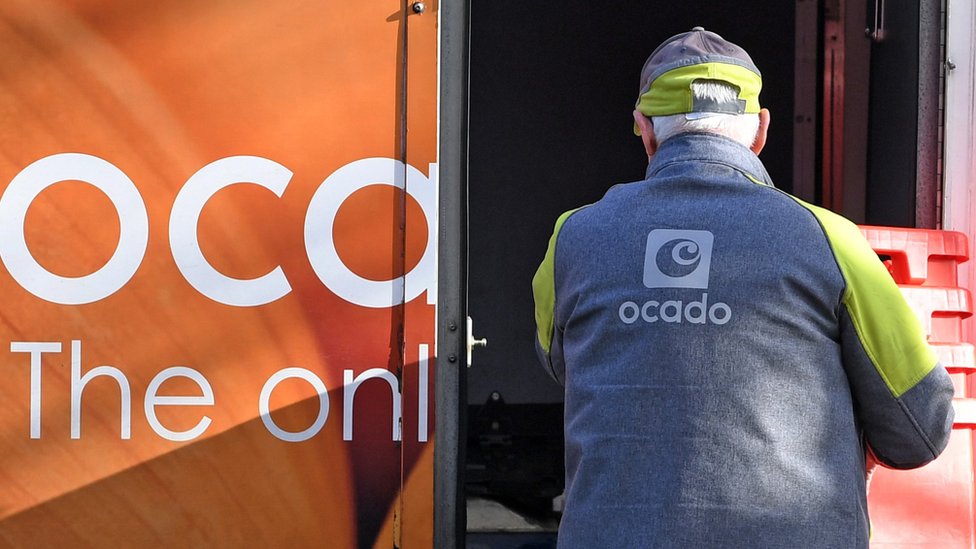
You shouldn't be that close to a delivery driver.
There is a small potential risk of contamination if the food or packaging has been handled by someone who has tested positive.
Online shopping customers are therefore generally advised to leave packaged goods for 72 hours if possible before handling them, or to spray and wipe plastic or glass containers with diluted bleach.
Unwrapped fresh goods should be washed under running water and left to dry.
End of Latest questions
Question topics
- All about coronavirus
- My health conditions
- Protecting myself and others
- Me and my family
- Leaving the house
- My finances
- Work issues
- Student issues
- Life after lockdown
All about coronavirus
Your questions
What is the coronavirus? from Caitlin in Leeds Most asked
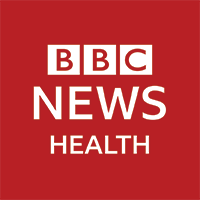
BBC News Health team
Coronavirus is an infectious disease discovered in China in December 2019. Its more precise name is Covid-19.
There are actually hundreds of coronaviruses - most of which circulate among animals, including pigs, camels, bats and cats. But there are a few - such as Covid-19 - that infect humans.
Some coronaviruses cause mild to moderate illnesses, such as the common cold. Covid-19 is among those that can lead to more serious illnesses such as pneumonia.
Most infected people will have only mild symptoms - perhaps a fever, aching limbs a cough, and loss of taste or smell - and will recover without special treatment.
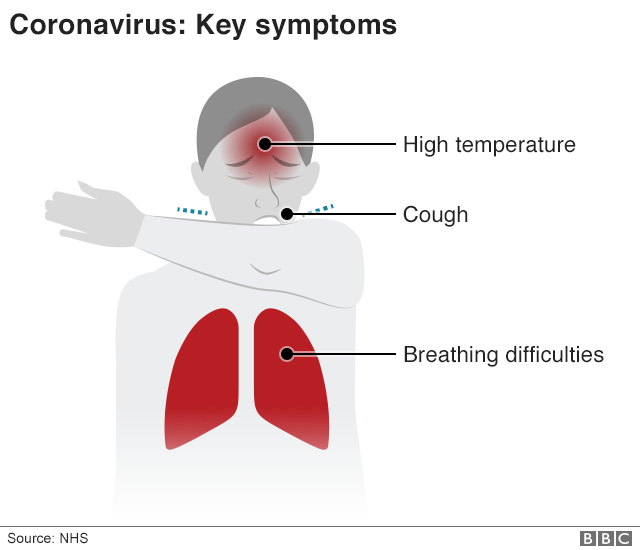
But some older people, and those with underlying medical problems such as heart disease, diabetes, or cancer are at greater risk of becoming seriously unwell.
The NHS has more about symptoms.
Once you've had coronavirus will you then be immune? from Denise Mitchell in Bicester Most asked

BBC News Health team
When people recover from an infection, their body is left with some memory of how to fight it should they encounter it again. This immunity is not always long-lasting or totally efficient, however, and can decrease over time.
It is unclear, though, if people who have recovered from coronavirus will be able to get it again.
University of Oxford’s Prof Sarah Gilbert, who is working on creating a vaccine for Covid-19, says that it “probably is likely” that an infected person will be able to be reinfected in the future.
The UK government views antibody tests - which can show if a person has had Covid-19 - as central to its plans to end the current lockdown and allow people to return to work.
But the World Health Organization has said that there is no evidence that antibody tests can show that a person has immunity or is protected against reinfection.
What is the incubation period for the coronavirus? from Gillian Gibs

Michelle Roberts Health online editor
Scientists have said that the “incubation period” - the time between catching the virus and starting to show symptoms - is five days on average. However, some people can have symptoms earlier or much later than this.
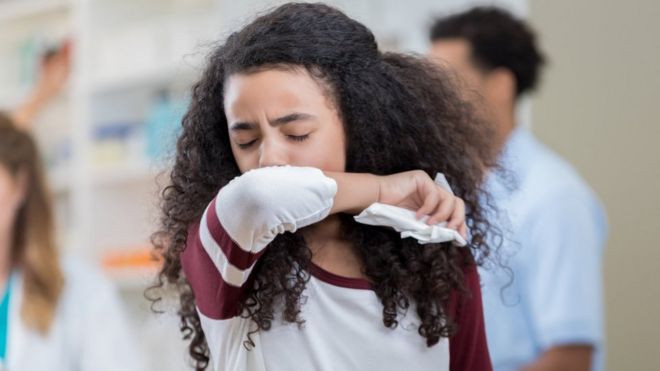
The World Health Organization advises that the incubation period can last up to 14 days. But some researchers say it may be up to 24 days.
Knowing and understanding the incubation period is very important. It allows doctors and health authorities to introduce more effective ways to control the spread of the virus.
Is coronavirus more infectious than flu? from Merry Fitzpatrick in Sydney

Michelle Roberts Health online editor
Both viruses are highly contagious.
On average, it's thought people with the coronavirus infect two to three other people, while those with flu pass it on to about one other person.
There are simple steps you can take to stop the spread of flu and coronavirus:
- Wash your hands often with soap and water
- Avoid touching your face unless your hands are clean
- Catch coughs and sneezes in a tissue and then put it in the bin
How long are you ill for? from Nita in Maidstone

BBC News Health team
For four out of five people Covid-19 will be a mild disease, a bit like flu.
Symptoms include [fever, a dry cough or loss of smell and taste(https://www.bbc.co.uk/news/health-51048366)
If the virus gets well established in the lungs it can cause breathing difficulties and pneumonia. About one in seven people may need hospital treatment.
Recovery time will depend on how sick you became in the first place. Some people will shrug off the illness quickly, but for others the path to full health could take months, and leave lasting problems.
End of All about coronavirus
Send us your question
My health conditions
Your questions
Why are diabetics not included in the clinically extremely vulnerable patients, and will the list be refreshed? from Derek Roberts in Hornchurch, Essex

Michelle Roberts Health online editor
Diabetics are not included in the list of people at highest risk who should shield at home. However, some may be advised to shield if they suffer from a combination of factors, such as heart disease or obesity, as well as diabetes - which put them at much higher risk of complications.
A third of virus deaths in England from 1 March to 11 May were linked to diabetes, but research suggests the threat for those under 40 with type 1 (insulin-dependent) or type 2 diabetes is still very low.
Age remains the strongest risk factor for becoming severely or fatally ill with coronavirus, say experts.
Diabetes UK advises anyone with diabetes to try their best to manage their condition carefully, keeping their blood sugar in range as much as possible, as well as following social distancing measures.
I have a tooth abscess. When will dentists be open for emergency care? from Sammie Bowman, Kent
Dental practices in England have been told they can reopen on 8 June, as long as they put appropriate safety measures in place.
These include limiting use of waiting areas, screening staff on a daily basis and installing physical barriers, such as a plastic shield, in reception areas.
Elsewhere in the UK, Scotland's chief dental officer has expressed hope that routine dental care will be available by the end of July. In Wales, the aim is to gradually reintroduce routine dental care before January 2021, and Northern Irish dentists are to discuss a schedule for reopening at a meeting on 2 June.
Currently, if a patient is in considerable pain, dentists can refer them to an Urgent Dental Care (UDC) hub. These centres have been created across the UK to provide emergency treatment while meeting social distancing requirements.
If a UDC centre is not available in your area, there may be other options. Some hospitals, for example, offer emergency dental walk-in services. But you should always speak to your local dentist first - or use the NHS 111 online service if you’re not registered with one.
How dangerous is coronavirus for people with asthma? from Lesley-Anne in Falkirk

Michelle Roberts Health online editor
Asthma UK's advice is to keep taking your daily preventer inhaler (usually brown) as prescribed. This will help cut the risk of an asthma attack being triggered by any respiratory virus, including coronavirus.
Carry your blue reliever inhaler with you every day, in case you feel your asthma symptoms flaring up. If your asthma is getting worse and there is a risk you might have coronavirus, contact the online NHS 111 coronavirus service.
Are otherwise healthy disabled people more at risk from coronavirus? from Abigail Ireland in Stockport

BBC News Health team
Coronavirus can be more severe in older people and those with pre-existing conditions such as heart and lung illnesses, or diabetes.
There is no evidence that disabled people who are otherwise healthy - and who don't, for instance, have respiratory problems - are at greater risk from coronavirus.
Will people who've have had pneumonia experience milder coronavirus symptoms? from Marje in Montreal

BBC News Health team
Covid-19 can, in a small number of cases, lead to pneumonia, most notably in people with pre-existing lung conditions.
But as this is a new virus, no-one will have any immunity to it, whether they have previously had pneumonia, or any other form of coronavirus such as Sars.
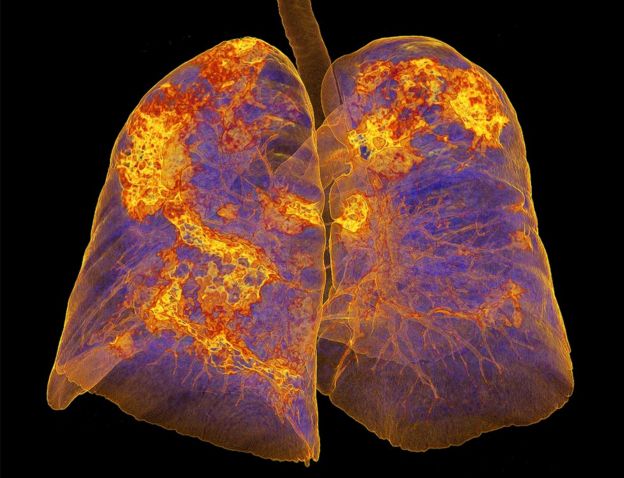
With key workers wearing some sort of mask, how are deaf people who lip-read supposed to understand what is being said? From Margaret Roll in Clevedon

BBC News Reality Check
Wearing masks has become commonplace not just in hospitals but also among the general public.
It presents major challenges for some deaf people who rely on lip-reading to communicate, but who also need to stay safe from catching the virus, especially if in a hospital setting.
The charity Action on Hearing Loss says there are some clinically approved see-through covered face masks that help enable lip-reading. However, they do not provide enough protection against aerosols spread by coronavirus, and wouldn’t be right for health and social care workers to use during this pandemic.
They say it might be worth using a small whiteboard to communicate. There are also some subtitling or captioning apps that may provide some help.
End of My health conditions
Send us your question
Protecting myself and others
Your questions
Skip Protecting myself and others
Is a scarf as a mouth covering enough for public transport? From Rachel in Exeter

BBC News Health team
Yes. According to the advice from Public Health England, a scarf or a bandana tied around your head is fine.
The important thing is that it covers both your mouth and your nose – and that you can breathe easily.
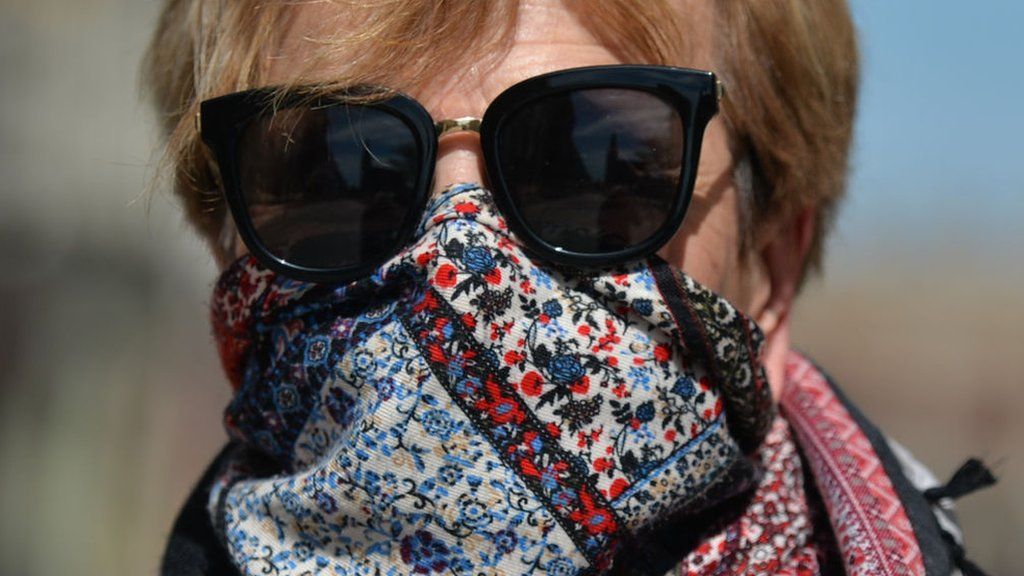
Whether you are wearing a scarf or a homemade mask, the advice is that you should continue to maintain other hygiene measures. So wash your hands, or use hand sanitiser before you put your face covering on and off, and don’t touch your eyes, nose or mouth at all.
Wash the face coverings after each time you use them (for this reason it might be worth avoiding textiles which need special care, such as wool or silk) and keep the used face coverings in a plastic bag until you can wash them.
Why are governments going to such extreme measures to combat coronavirus when flu appears to be more deadly? from Lorraine Smith in Harlow

James Gallagher Health correspondent
Quarantining cities and telling people to stay at home may seem extreme, but the alternative is to let the virus spread unrestrained.
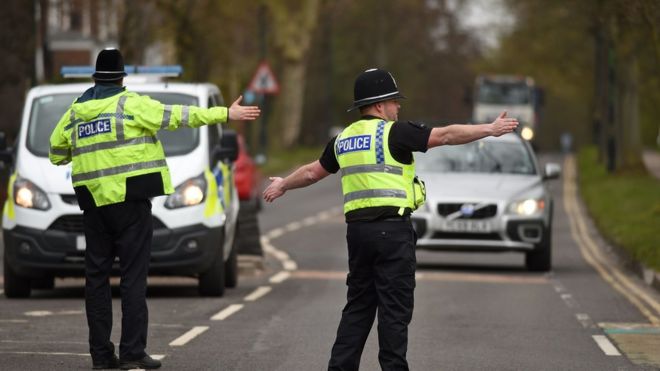
There is no vaccine for this new virus, as there is for flu, which makes elderly people and those with underlying health conditions very vulnerable to its effects.
Do we not have reusable PPE and can't it just be washed or left for three days for any present virus to die? from Chris Stone in Lancashire

BBC News Health team
All personal protective equipment (PPE) worn during the highest-risk situations - such as aprons, gloves and surgical masks - should usually be disposed of after a single use or session.
However, guidelines now say NHS staff can reuse some kit where it is safe to do so. For example, some gowns could be washed by the hospital laundry and reused.
The Health and Safety Executive says it recognises "some compromise" is needed in these "exceptional circumstances". But doctors and nurses are not happy with this situation.
The Royal College of Nursing says its members can refuse to treat patients as a "last resort" if adequate PPE has not been provided.
What should I do if someone I live with is self-isolating? from Graham Wright in London

BBC News Health team
If you’re living with someone who’s self-isolating, you should keep all contact to a minimum and, if possible, not be in the same room together.
The person self-isolating should stay in a well-ventilated room with a window that can be opened, and keep away from other people in the house.
If you live with someone who has symptoms, you'll also need to self-isolate for 14 days from the day their symptoms started - this is how long it can take for symptoms to appear.
If you get symptoms, self-isolate for seven days from when your symptoms start, even if it means you're self-isolating for longer than 14 days. If you do not get symptoms, you can stop self-isolating after 14 days.
I am currently self-isolating. Can I attend a hospital appointment? from Patricia Welsh in Aylmerton, Norfolk

BBC News Health team
The current government advice is to access medical assistance remotely, wherever possible.
However, those with a scheduled hospital or other medical appointment during this period, should talk to their GP or clinician.
This is to ensure that they continue to receive the care they need and consider whether appointments can be postponed.
Should people stop having sex? from Martha Menschel in Las Vegas

BBC News Reality Check
If you live with your partner, they count as being part of your household. If neither of you is showing coronavirus symptoms and you are already in close contact, having sex won't increase the likelihood of you catching the virus from one another. If one person does have symptoms, they should be self-isolating in a separate room.
Using contraception such as condoms won't alter your risk of catching the virus, as having sex will bring you into close physical contact anyway.
"If you are going to touch each other's genitals it's likely that you will potentially be kissing at the same time - and we know the virus is passed through saliva," Dr Alex George told the BBC's Newsbeat.
"Essentially, any possibility of transfer of coronavirus - from your mouth to your hands, to genitals, to someone else's nose or mouth - increases the risk of passing on coronavirus."
How are there still so many new cases of coronavirus occurring during the lockdown? Is it known if it is from people not observing the rules? From Susan Pugsley in Sanford

BBC News Reality Check
It’s actually difficult to know how many new cases of coronavirus there have been during the lockdown, because until recently, there has been very little testing of the population as a whole (it was mostly just those in hospital and some NHS and care staff who were being tested).
There is also a lag effect with the figures. It takes time for the effects of social distancing to be seen in the daily figures for cases, hospitalisations and then deaths - around three weeks at least - so it may appear as if there are more cases than there currently are. It’s true that some people have been ignoring the rules regarding lockdown. But police chiefs say that compliance is still holding up.
What we do know is that confirmed daily cases of the virus have been on a downward trend since early April, and the rate of infection has dropped significantly. There’s also been a fall in the number of new people being hospitalised, or dying from the virus.
Where there does seem to be a steady rise in the number of cases is in the UK’s care homes. Latest figures suggest that a third of all coronavirus deaths in England and Wales - and nearly half of those in Scotland and Northern Ireland - take place there.
How will routine NHS services be restarted? from Emma Snow in London

BBC News Health team
Following a drop in hospital patients with Covid-19, the NHS has now outlined its approach to resuming other services in England.
Urgent outpatient appointments will go ahead and routine surgery could be restarted, but GPs will continue to use online consultations, and regular testing will be offered to all staff. The NHS says the pressure on many staff will "remain unprecedented" and employers must keep them safe.
Routine elective surgery will be restarted, with priority given to "long waiters", and cancer referral and diagnostic appointments will be brought back to “pre-Covid-19 levels”.
Discussions are taking place in Wales and Northern Ireland on how to resume normal NHS services. Scotland's health secretary has announced that NHS services will be gradually restarted, without committing to any dates.
We've been told that we must learn to live with the virus so does this mean I have to shield indefinitely? From Deborah Lyons in Sheffield

BBC News Health team
The simple answer is that we simply don’t know.
People who were in the highest risk category if they were to contract coronavirus were contacted by the NHS in March and told not to go out for 12 weeks. These are people with specific medical conditions.
The government is now advising these people - more than one million around the UK - to shield until the end of June.
Vulnerable people in England and Wales have been advised that from the beginning of June, they will be able to go outdoors with members of their household. Those living alone can meet with someone from another household while maintaining social distancing. Shielding advice in Northern Ireland and Scotland has not yet changed.
End of Protecting myself and others
Send us your question
Me and my family
Your questions
I am five months pregnant and want to understand the risk to the baby if I get infected? from a BBC website reader

James Gallagher Health correspondent
Pregnant women are being advised by the UK government to stay at home and keep contact with others to a minimum. However, they should attend antenatal clinics as normal.
There is no evidence to suggest that pregnant women are more likely to get coronavirus. But, for a small number of women, being pregnant may change the way their body deals with a severe viral infection.
The government’s chief medical adviser says this is a precautionary measure until scientists find out more about the virus and that "infections and pregnancy are not a good combination in general”.
I am breastfeeding my five-month-old baby - what should I do if I get coronavirus? from Maeve McGoldrick

James Gallagher Health correspondent
Mothers pass on protection from infection to their babies through their breast milk.
If your body is producing antibodies to fight the infection, these would be passed on through breastfeeding.
Breastfeeding mums should follow the same advice as anyone else over reducing risk - cover your mouth when you sneeze and cough, throw away used tissues straight away and wash hands frequently, while trying to avoid touching your eyes, nose or mouth with unwashed hands.
Is it possible to catch coronavirus from a pet dog or cat? from Javed

BBC News Reality Check
This is highly unlikely to happen, according to scientists and vets.
While there are rare cases where an animal has caught the virus from a human, there is no evidence that humans can catch the virus from animals.
It is possible that a pet's fur could become contaminated if an infected person has previously touched or stroked the animal.
But even without the threat of coronavirus, you should always wash your hands with soap and water after handling an animal or its lead, and avoid touching your nose and mouth.
What is the risk to children? from Louise in London

BBC News Health team
In general, children appear to be relatively unaffected by coronavirus, according to data from China and other countries.
This may be because they are able to shake off the infection or have no symptoms or only very mild ones similar to a cold.
However, children with underlying lung problems, such as asthma, may have to be more careful.
All schools in the UK are currently closed, except for vulnerable pupils or children of key workers.
Will I get fined if I refuse to send my child back to Reception on 1 June? from Emma Jane Parker in Hull

Sean Coughlan Education Correspondent
Primary schools in England are starting to reopen from 1 June, depending on the number - pupils in Reception and Years 1 and 6 are among the first to return. It's expected that about half of the children entitled to return will do so.
At present, it is not compulsory for parents to send their children to school, and there will be no fines for non-attendance. However, the government says that eligible children are "strongly encouraged" to attend.
It is expected that this temporary arrangement - where usual sanctions do not apply - will continue for all parents of any year groups going back in England during the summer term.
There are currently no plans for schools in Wales, Scotland or Northern Ireland to reopen before the end of the summer term.
End of Me and my family
Send us your question
Leaving the house
Your questions
Can I walk my dog under the category of daily exercise? from James Leslie, Burgess Hlil Most asked

BBC News Reality Check
You can walk your dog as much as you like.
The government has said people can exercise outside as many times a day as they want, and can spend time outside not exercising, as long as they remain 2m (6ft) away from anyone outside their household.
There is no guidance from the government on whether your dog should be on a lead, but the Royal Parks, for instance, urge visitors to do this, to help ensure people practise social distancing.
Is there a time limit on how long we can be outside for once-a-day exercise, and are we allowed to get in our car to travel to go for a walk? from Sam Fearn, York Most asked

BBC News Reality Check
The government has said people in England can exercise outside as many times a day as they want. They can also spend time outside not exercising, as long as they remain 2m (6ft) away from anyone outside their household.
The Welsh and Scottish governments have also said people can exercise outdoors more than once a day.
You still can't use playgrounds, outdoor gyms or other outdoor leisure venues, where there is a higher risk of close contact and touching surfaces.
In England, you can drive to outdoor open spaces to exercise irrespective of distance, as long as you follow social distancing while you are there. However, in Scotland and Wales, people are being told to stay within about 5 miles of their homes while outside. In Northern Ireland, there are "no restrictions" on travel for those who are not self-isolating.
My children live with their mother, but visit me. I live about 190 miles from them. Is it legitimate travel for me to drive to collect them? from Mark in Swansea

BBC News Reality Check
Yes it is.
Government guidance on staying at home says: "Where parents do not live in the same household, children under 18 can be moved between their parents' homes."
If neither parent nor child is showing symptoms of the virus or self-isolating, children of separated parents are still allowed to stay with either of them.
However, the Family Division of the High Court has said that, in England and Wales, if one parent is worried that moving their child would be going against public health advice, they may "vary the arrangement to one that they consider to be safe", even if the other parent does not agree.
Where this is the case, family courts will expect parents to allow contact by video chat or phone.
Why are people still flying into UK from Italy, USA, and China? from D Cutler in Hereford

BBC News Reality Check
The number of flights arriving in the UK has dropped dramatically during lockdown.
The UK government has said it will introduce a two-week quarantine period for international passengers from 8 June.
If travellers cannot say where they plan to self-isolate, then they will do so in accommodation arranged by the government.
There are some exemptions, including people arriving from the Republic of Ireland.
Airlines and airport operators have said that maintaining social distancing is very difficult, and many are advising passengers to wear face coverings and gloves. Healthrow is trialling large-scale temperature checks for some passengers.
My daughter was learning to drive and had her test booked in June. Can I now continue taking her out for a weekly lesson? from David Ford in Long Eaton, Derbyshire

BBC News Reality Check
Driving tests were suspended in England, Scotland and Wales for three months from 20 March. So unless it was booked for a date after 20 June, the test will not take place as planned. A similar situation is in place in Northern Ireland.
A new date for anyone whose test is cancelled will be automatically sent out by the Driver and Vehicles Standards Agency (DVSA). You cannot book a new date for a driving test yourself.
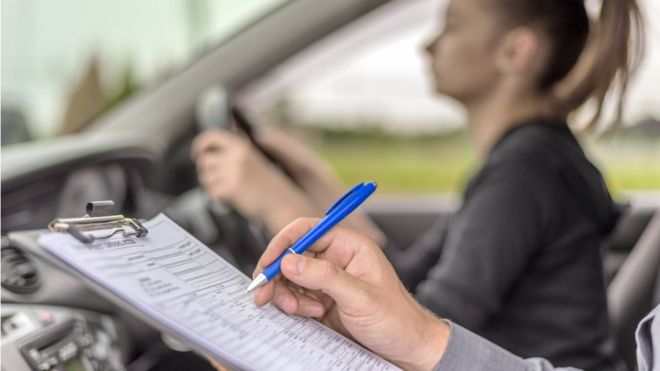
You can still apply for an emergency driving test if you’re classed as a critical worker.
In Scotland, Wales and Northern Ireland, taking a family member out for a driving lesson is still not allowed, as it is not counted as an essential journey.
The Department for Transport has indicated that this is also still the case In England, despite the recent lockdown changes. However, the AA says it’s not clear whether this would be the case if, for example, a driving lesson was given on the way to do essential shopping.
End of Leaving the house
Send us your question
My finances
Your questions
Will lenders allow people with mortgages to delay payments during the outbreak? from Clare Waters

Simon Gompertz Personal finance correspondent
People affected by coronavirus will be able to delay their mortgage payments for up to three months.
It is important to bear in mind that any interest and capital repayments which are missed, will be added to the mortgage balance.
This means that any future monthly mortgage bills are likely to be slightly higher.
How do you get gas and electricity if you are on a pre-payment meter and can't get to a post office to top it up? from David E P Dennis

Simon Gompertz Personal finance correspondent
Energy companies have promised to help you if you have a pre-payment meter. So you may be able to authorise a friend to top up your energy card for you.
You could also ask your supplier to send you a card by post which is already topped up. The government says that if it's urgent the supplier should be able to add credit directly to your account. You should be able to top up online as well.
And you will have to pay back any credit your supplier gives you. So you should contact them to ask about when and how to do this.
What should I do as I have not received a refund for a cancelled flight? From Susan in Offley

BBC News Reality Check
If your flight is cancelled, you are entitled to a full refund to the original form of payment within seven days, although many airlines are struggling to meet that deadline.
Ryanair, for example, says customers who want a cash refund will receive it ''in due course'' as it is dealing with a much higher volume of requests than usual, with fewer staff.
Many airlines are trying to avoid giving refunds and are offering vouchers for another flight or a free re-booking instead.
If the airline later folds, the voucher will probably become invalid. And any rebooking could affect the terms of your travel insurance.
End of My finances
Send us your question
Work issues
Your questions
My employer is enforcing a 14-day quarantine after any foreign holiday, which will not be paid. Can they do this? From Kinley Smith in Ashbourne, Derbyshire
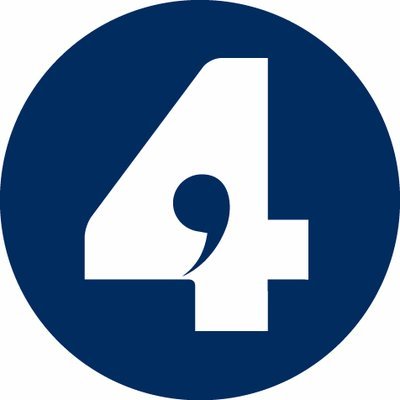
Moneybox team BBC Radio 4
There is no specific guidance on this, according to employment lawyer Susie Al-Qassab, but as long as you are not unwell, and your role permits it, your employer should allow you to work from home on full pay.
If you cannot do your job from home, then the unpaid leave may be seen as a suspension and may not be allowed.
You should check your contract to see what your employer is entitled to do. If they are acting beyond their rights, they will need to seek to reach an agreement with you not to attend work for a specific period (which would usually need to be treated as paid leave)
Statutory sick pay (SSP) is currently payable to all those who are self-isolating. You should query whether this is available to those who are self-isolating because they have returned to the UK from abroad.
I am a self-employed music teacher. If I cannot work, will the government still help the self-employed financially until October? from Jess in Essex

BBC News Reality Check
If you’re self-employed, you could be eligible for a taxable grant of up to 80% of your trading profits up to a cap of £2,500 per month, if your livelihood has been affected by the pandemic, and you meet certain conditions.
You must have been self-employed since at least the start of April 2019, and have a trading profit of less than £50,000 a year on average.
Initially, this was a one-off payment designed to cover March, April and May, up to a maximum total of £7,500. In August, applications will open for a "second and final" payment covering 70% of profits, up to a cap of £2,190 a month for another three months (£6,570 in total).
The scheme - which is called the Coronavirus Self-Employment Income Support Scheme - is open to any claimant who makes more than half of their income from self-employment.
My company wants me to return to work within the lockdown period. Is this legal? From Jim Bridgeman in Kettering

BBC News Reality Check
The government has said that everyone should work from home if possible, and only go into a workplace if their job "absolutely cannot be done from home".
Your employer has a duty to protect your health and safety. If you or a member of your household have an underlying health condition which increases vulnerability to coronavirus, you could argue that you have a right not to come into work.
If you still do not want to go in, you could ask to take time off as holiday or unexpected leave, but your employer does not have to agree to this.
An employer could bring disciplinary action against an employee who they consider to be refusing to work without a good reason.
I'm self-employed. Can I claim benefits if I can't work due to the virus? from Mark Gribby in Nottingham

Simon Gompertz Personal finance correspondent
Self-employed people who have symptoms or have been told to self-isolate may apply for two benefits - universal credit or employment and support allowance.
Normally, you would be eligible after four days of being ill. However, the government has responded to the spread of coronavirus by saying that companies will temporarily pay SSP from the first day off.
But charities are worried that there is still a five-week delay before universal credit is paid.
What if you're not on a salary and can't work from home if your workplace closes? from Joseph in Glasgow

Simon Gompertz Personal finance correspondent
If you are employed, your employer has an obligation to pay your Statutory Sick Pay (SSP) for up to 28 weeks.
Normally, you would be eligible after four days of being ill. However, the government has responded to the spread of coronavirus by saying that companies will temporarily pay SSP from the first day off.
In the case of small and medium-sized employers, the government will fund sick pay for the first 14 days.
Eligible employees are entitled to £95.85 a week.
Who is eligible for universal credit? from Mario in London

Moneybox team BBC Radio 4
Anyone aged 18 or above can apply for universal credit if they live in the UK and are on a low income or out of work.
Students in full-time education aren’t usually eligible for universal credit, but they can make a claim if they do not have any parental support, are responsible for a child or are in a couple with a partner who is eligible for universal credit.
People aged 16 or 17 can also apply for universal credit if they do not have any parental support, are responsible for a child, caring for a disabled person or cannot work.
You can use the government's benefits calculator to find out how much you may be entitled to.
End of Work issues
Send us your question
Student issues
Your questions
I am supposed to be starting university in September. Is there any point in me going this year or shall I defer until next year? from Danny in Scunthorpe

BBC News Reality Check
Ultimately this is a personal decision, but it echoes what a lot of students are thinking right now.
A recent survey of students applying for undergraduate places found that more than one in five were considering deferring for a year if universities were not going to operate normally.
University campuses have been closed this term by the Covid-19 outbreak and there is no guarantee how far they will open in the autumn. The University of Cambridge has said it will have no face-to-face lectures in the next academic year, and the University of Manchester has said that, to begin with, its lectures will be taking place online only. Other universities are considering a delay to the start of the academic year.
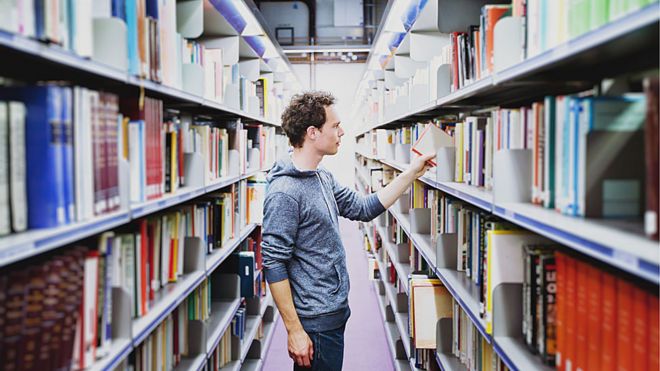
Before you make a firm choice, the higher education watchdog, Office for Students, says your university should give you “absolute clarity” on whether courses will be online, on-campus or a mixture. And if the information isn't available next month it must be provided before clearing in August.
Once you have all the information, you need to weigh up what's important to you. Bear in mind the universities minister says you'll have to pay full fees even if you're learning online - but if you are offered distance learning you could potentially save on accommodation and other living expenses.
Also, if your university can offer a campus experience, access to facilities like libraries, bars and cafes is likely to be limited - so student life could be very different to normal.
Can university students get their tuition fee refunded for disruptions to teaching because of Covid-19? from Sophie in Liverpool

Moneybox team BBC Radio 4
The Department for Education has indicated that it is possible for students to get their fees back.
In a statement, it said that if universities are “unable to facilitate adequate online tuition then it would be unacceptable for students to be charged for any additional terms”.
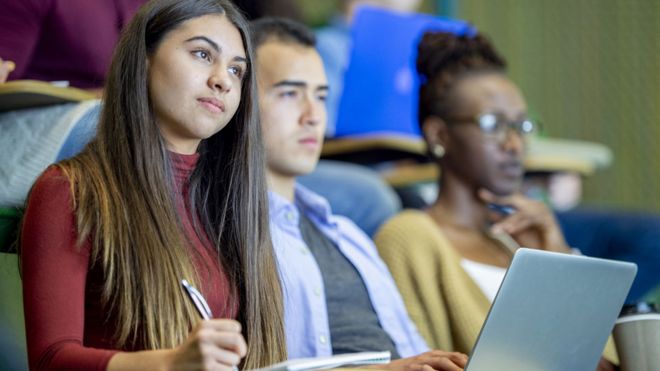
To claim a refund, students first need to complain directly to their university. If that is unsuccessful then students in England or Wales can lodge an appeal with the Office of the Independent Adjudicator (OIA).
If your university is in Scotland then it’s the SPSO (Scottish Public Services Ombudsman) and for Northern Ireland, you go to the NIPSO (Northern Ireland Public Services Ombudsman). Students will need a “completions procedure form” from their university in order to file an appeal.
Can you cancel your student property lease early - and if so, how? From Honor in Edinburgh

Moneybox team BBC Radio 4
Most students have gone home to self-isolate, leaving their student properties empty but they still have to pay rent.
If you’re worried about paying rent for an empty student property, first of all check your tenancy agreement. Some contracts will have a “break clause” which will allow you to cancel your lease early if you give your landlord enough notice.
If you don’t have a “break clause”, you can always speak to your landlord and ask for a “reduced payment plan”. This could mean you pay less rent each month.
End of Student issues
Send us your question
Life after lockdown
Your questions
When will UK prisons be open again for social visits? from Hazel

BBC News Reality Check
The Ministry of Justice has not given a date for the resumption of visits. It says the measures are temporary, and that the restrictions will be reviewed at some point, taking into account public health advice.
Prison visits were suspended at the beginning of the lockdown in March. Since then, relatives and friends have had the option of writing to inmates, or sending an email to the prison, which is then printed out and passed on.
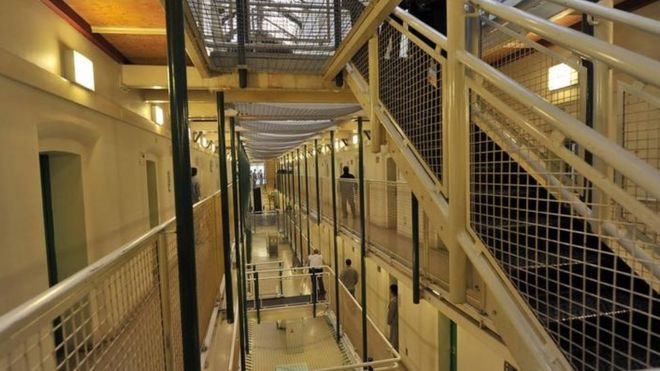
As a temporary measure, secure phone handsets have been given to pre-approved prisoners at 55 prisons, allowing them to speak to a small number of pre-authorised contacts.
Video calls are also being rolled out at a number of prisons and young offender institutions.
When are church and other religious services likely to be able to resume? from Christopher Martin in Camberley

BBC News Reality Check
The earliest point at which places of worship could open is early July, when the prime minister says some public places could reopen, “provided they are safe and enforce social distancing”.
However, several religious leaders have expressed doubt that they will be able to ease restrictions soon.
Ibrahim Mogra, a senior imam in Leicester, told the BBC that mosques present particular problems: "We are talking about a five times regular daily attendance compared to other places of worship," he said. "So we are talking about really large numbers of people."
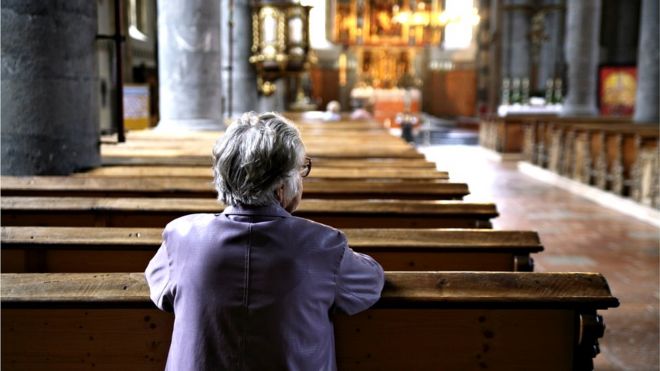
The Church of England says that it does not expect to resume normal services before the end of the year, although the approach would vary on a regional basis.
The Rt Rev Sarah Mullally, who’s leading the Church’s plans for reopening, says questions remain about various aspects of worship including sharing hymn books, distancing within the church buildings, and Holy Communion.
What are my chances of getting a job in lockdown/when lockdown is over? from Jess in Essex

Moneybox team BBC Radio 4
Research conducted by the Resolution Foundation has found that the coronavirus pandemic could increase youth unemployment by 600,000 this year.
If you’re worried about finding a job you can head to the National Careers Service for advice on how to find job vacancies.
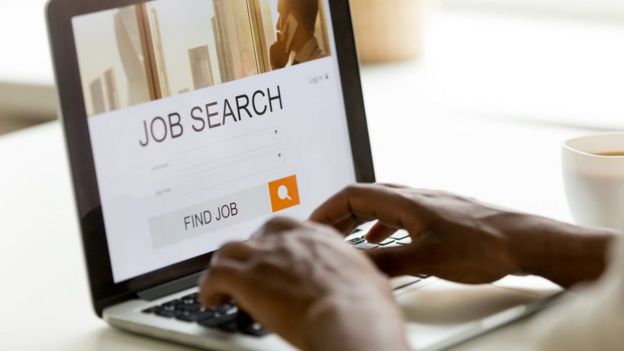
You can also search online for virtual job fairs. This could help you explore different job opportunities and connect with potential employers directly from home.
Experts recommend using lockdown to refresh your CV and also look for any online training opportunities which might put you in a better position when you eventually apply for a job.
End of Life after lockdown
Send us your question

What questions do you have about coronavirus? Do you want to ask it on BBC News? Get in touch and we may ask you to send us a video of you asking your question.
In some cases, your question will be published, displaying your name, age and location as you provide it, unless you state otherwise. Your contact details will never be published. Please ensure you have read our terms & conditions and privacy policy.
Use this form to ask your question:
If you are reading this and can't see the form above you will need to visit the mobile version of the BBC website to submit your question or send them via email to YourQuestions@bbc.co.uk. Please include your name, age and location with any question you send in.